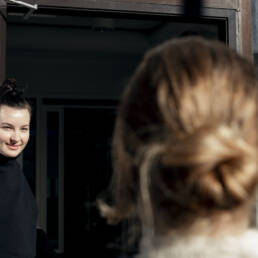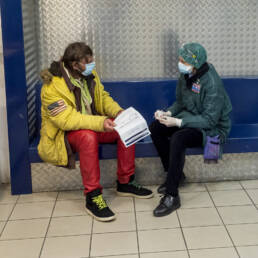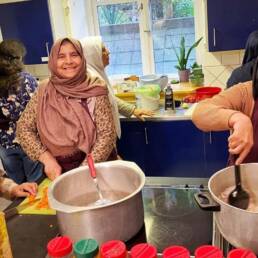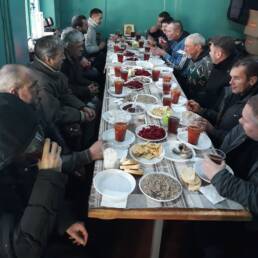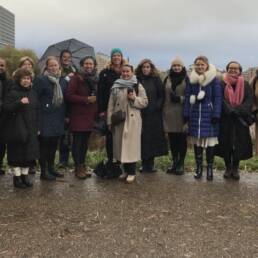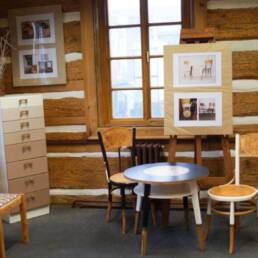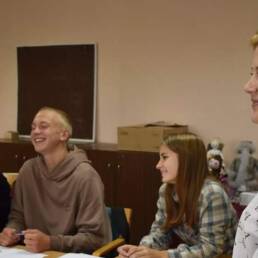Author
Esther Bohé
Senior Institutional Development Officer
Caritas Europa
With excitement in their faces the children came running towards us – a little group of Caritas volunteers, Sr. Darja and myself – when we entered the department for minors of a mental health hospital in Vitebsk, Belarus’ fourth largest city in the northeast of the country and birthplace of Marc Chagall.
It was time for the weekly visit of this little group of committed young women who come there to spend some quality time with the kids (aged 6 and older). On that day they had prepared a small crafts workshop.Quickly a bustling crowd gathered around the two small tables and started painting, gluing, folding… This weekly effort will soon become more sustainable – Caritas Vitebsk was just granted a project to create a fixed crafts corner for the children. A very welcome change to the rather sterile and cold looking hospital ward. And an inspiring first experience of my recent visit to Caritas Belarus.
 In the following days, I visited many other projects and also met a few beneficiaries. I was amazed and impressed by the inclusive approach and the positive impact of the work of Caritas in the country. Integrating all members of society and making them feel worthy – regardless of age, physical or mental limitations – is quite an achievement and certainly a very strong aspect of Caritas’ work in Belarus.
In the following days, I visited many other projects and also met a few beneficiaries. I was amazed and impressed by the inclusive approach and the positive impact of the work of Caritas in the country. Integrating all members of society and making them feel worthy – regardless of age, physical or mental limitations – is quite an achievement and certainly a very strong aspect of Caritas’ work in Belarus.
Br. Andrej and Dimitri took me to a day-care centre for young adults with mental and/or physical disabilities. There Caritas Minsk offers painting workshops with professional guidance and two of the young people recently found work in this field. One of the beautiful paintings that are the result of this common effort will soon be presented to the Minister of Labour and Social Protection.
I also met Maryna, a volunteer, who teaches inclusive dance at Caritas Vitebsk, which is designed to meet everyone’s needs, regardless of ability or disability, with a focus on exploring and developing individual creativity and physical potential. Her students Valera, who has been in a wheelchair from early childhood, and Khrystyna have twice won prizes at the Inclusive Dance Competition in Moscow.
These are just a few examples of the projects I visited, always accompanied by Anna from Caritas Belarus and either Fr. Vitaly, Sr. Darja, Br. Andrej, Dimitri, or Ludmilla. My last and maybe also most memorable experience happened in the framework of the Tabitha project for bedridden people and families in similar difficult situations in Minsk.
When Caritas social worker and nurse Natalia entered the apartment of Vladimir* his face brightened. He also seemed delighted by the extra visitors and immediately started chatting and gradually telling his story. He has been bedridden since a heart attack four years ago and with his children out of reach state-support barely kept him alive. He told us that since Caritas started to visit him regularly his health has improved, he started exercising with his arms and he is (visibly) in good spirits. “This is the most important thing, to stay positive”, he said. Afterwards we visited Olga* who is suffering from dementia and now receives visits twice a day by Caritas staff of the Tabitha project. She asked Natalia several times to recite a blessing she has received in a greeting card from Brother Andrej (priest of her Parish and Director of Caritas Minsk) for the holiday season and she smiled at every recital. The immediate impact of Caritas’ work on the well-being of these two people moved me deeply.
The tireless commitment of the social workers of the Tabitha project; the efforts of Caritas Belarus helping the elderly to stay active members of society and to feel valued; the persistence of Caritas Vitebsk improving the lives of children living in state institutions; the wonderful successes of Caritas Minsk showing that everyone can contribute to society in a meaningful way; and of course the crucial work of Caritas Belarus to further develop Caritas in the country and to improve the structures between all the important actors – all this work to help to maintain or give back dignity to the most vulnerable people in society was very impressive and enriching.
It is a daily struggle for Caritas Belarus and the Diocesan Caritas in Minsk-Moghilev, Vitebsk, Grodno and Pinsk-Brest to overcome bureaucratic hurdles, build trust with important stakeholders and find funding for their many activities to help those most in need. But this does not stop our colleagues in Belarus from giving their best to put our Caritas values of solidarity and fraternity into practice and work hard to foster human integral development and achieve human dignity for all people. And it makes us at the Caritas Europa Secretariat proud to be part of the Caritas family.
*Name changed to protect identity.




